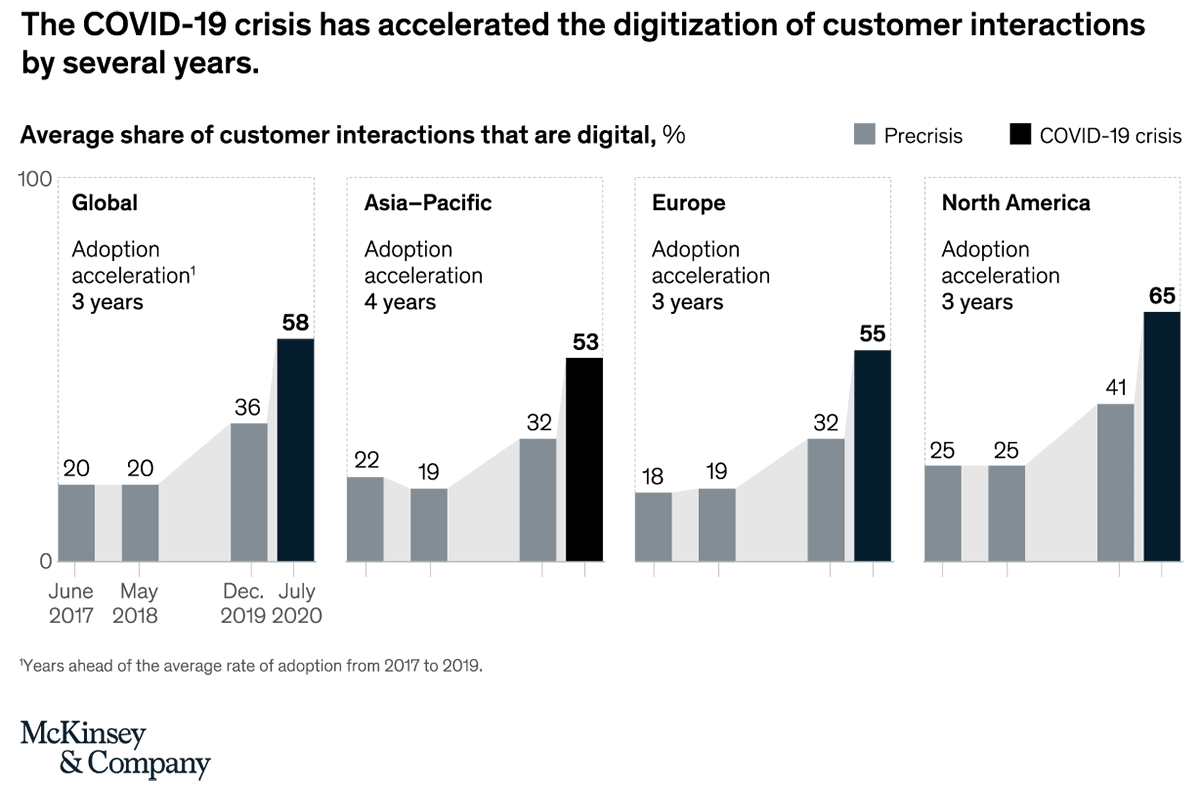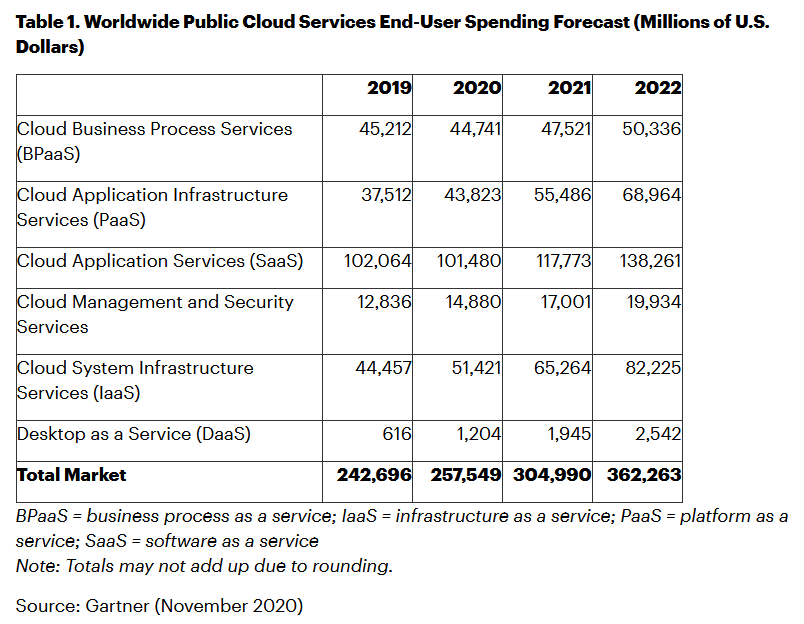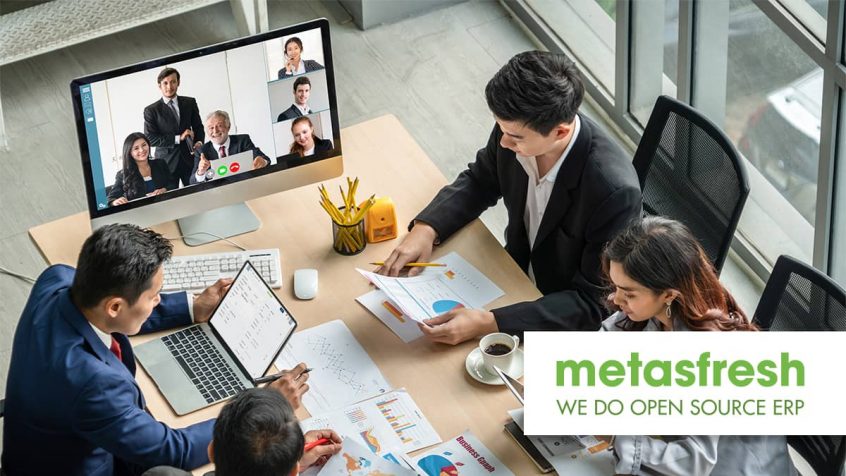Share this Post
The COVID-19 crisis has expedited the pace of digitisation of companies’ customer and supply-chain interactions and internal operations by as much as four years. The rapid acceleration in digital transformation plans has provided the impetus for related changes in enterprise technology strategies.

Average share of customer interactions that are digital. —Source: mckinsey.com
Cloud adoption has emerged as the ‘new normal’ as organisations invest in on-demand, scalable cloud models to address the challenges of cost efficiency and business continuity.

Worldwide Public Cloud Services End-User Spending Forecast. —Source: gartner.com
In addition, there is a lot of focus on ERP innovation, the core engine of every business, as a key driver for successful digital transformation. And the pandemic has helped accelerate the shift from on-premise to cloud ERP with the primary advantage in times of remote work being that cloud-based applications are ideal for remote work.
Every ERP implementation strategy, be it upgrade or replace, comes with its own set of challenges. However, these challenges only get amplified when an inherently complex endeavour like ERP implementation has to be delivered remotely.
But it is entirely possible to successfully manage ERP implementations with a remote model. In fact, remote delivery may even open up opportunities that may be lacking in on-site projects.
The case for remote ERP implementation
Combining a modern cloud delivery model with a remote approach to implementation enables businesses to reimagine the entire transformation process. In fact, even over the long-term, a cloud model could possibly help shift ERP implementations from a calendar-based approach to a need-based model where improvements and upgrades are delivered remotely and when required.
Over and above that, remote delivery enables several significant and immediate advantages that could well make it the norm at least for cloud ERP systems.
More comprehensive and productive interactions and engagements
Since remote delivery dispenses with face-to-face meetings for virtual interactions, it is essential to schedule stakeholder engagements into smaller units of coordinated quality-controlled meetings. Though this may require more collaborative effort at the outset, it can yield several benefits across the implementation process. For instance, not only can this enable more focused interactions scheduled around the availability of key executives and project leaders, but it also opens up the opportunity to engage with employees and end-users at an early stage. This ensures that system capabilities are perfectly aligned with business objectives and user needs and employees are introduced early to the functionalities of the new system, which can significantly reduce the resources for post-implementation training and support. Perhaps most importantly, the flexibility to schedule these short interactions around the availability of employees allows key managers and decision-makers to focus on their everyday responsibilities and still contribute to the ERP transformation.
Connecting the details to the big picture
Breaking down interactions into smaller discrete and more frequent sessions allows all participants to focus on the finer details of a company’s ERP transformation agenda. Each of these details can then be examined and discussed more comprehensively in order to assess how they connect and contribute to the big picture vision for ERP implementation. This unitised approach makes it possible to emphasise all the important details that are essential to realising the project’s success as well as to identify requirements that may not be as critical. Using small incremental steps to plot the path for ERP transformation from individual requirements to strategic capabilities can help simplify, focus and streamline the delivery process.
Lower costs, higher value
According to some estimates, implementation costs can account for 30-40% of total ERP project cost. And most implementations, regardless of deployment model, overrun their schedule by 30% and their budget by 33%.
With remote delivery, much of the indirect costs of implementations, such as travel, accommodation, transport, hospitality, can be significantly reduced if not completely eliminated. Additionally, there are significant productivity costs associated with the on-site consulting model. For instance, long-scheduled direct meetings may have to be rescheduled due to business exigencies or the unavailability of key personnel. Moreover, engaging multiple personnel from key functions for extended blocks of interactions can also have an impact on individual and operational productivity. All these challenges only get exacerbated for multi-location projects, resulting in serious cost and time overruns.
The remote implementation model can help businesses to effectively address a range of cost, time and productivity challenges associated with on-site implementations. This means that organisations can finally focus on project ROI and business value.
Remote ERP delivery has the potential to enable more productive, and more flexible, engagement with key decision-makers across the enterprise, accelerate deployment, reduce cost and increase ROI. However, shifting from the conventional resource-intensive on-site model to a virtual model will require a transformation both in terms of mindset as well as standard implementation procedures and best practices.
Of course, as with all ERP implementations, the choice of partner will be a critical factor in the successful remote implementation of an ERP solution.
Here’s how metasfresh can help
The ideal ERP partner is not merely a technology vendor or integrator but a business partner and a value creator. Though this has always been a key criterion for evaluation, it has only become in current times as businesses are trying to accelerate the time-to-value of their ERP investments.
However, shifting from the on-site approach requires partners with the unique mindset, capabilities and business model required for successful remote implementation. At metasfresh, for instance, remote implementation capabilities are part of our operational framework. We have always offered remote support for our customers in implementing and adapting metasfresh ERP and will continue to do so even if remote implementations somehow turn out to be a fad post-pandemic.
More importantly, our entire business philosophy is derived from the principle that businesses should invest in their own growth rather than in ERP licences. And since selling software licences is not our business model, we are totally focused on the quality of our software and our customer support. The emphasis at metasfresh, therefore, is twofold. One, develop fully-functional, ready-to-use, weekly-updated open-source software that can be quickly and cost-effectively implemented to every customers’ unique requirements. And two, deliver higher-than-industry-average enterprise support with a range of technical assistant packages to suit every customer’s needs.
If you’re in the market for a business partner with the credentials for quick, cost-effective, remote ERP implementation, get in touch with us today. Let’s co-create some value.
Since 2006, we have been developing our metasfresh ERP software non-stop with open source components and under the open source licenses GPLv2 and GPLv3. Our mission is to enable each and every company to access a powerful ERP system that supports digital transformation and fuels corporate growth. Get in touch today for more information and insights.
Share this Post



